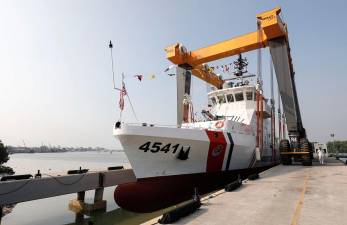PETALING JAYA: The Malaysian Maritime Enforcement Agency (MMEA) is hemorrhaging maintenance funds on an antiquated fleet, with more than six in every ten ringgit spent on vessels that have exceeded three decades of service.
The 2025 Auditor-General’s Report Series 3, delivered to Parliament today, exposed significant financial management shortcomings within MMEA, highlighting how the agency’s dependence on aging maritime assets is driving up operational costs while undermining efficiency.
The audit revealed a troubling spending pattern for 2024: RM229.93 million—representing 61.7% of ship maintenance allocations—was directed toward vessels surpassing 30 years of age. Meanwhile, boats aged between 11 and 20 years consumed RM78 million, accounting for 54.4% of maintenance funds in that category.
This heavy reliance on outdated assets not only escalates maintenance risks but also compromises the maritime agency’s ability to carry out its enforcement duties effectively, the report warned.
Another critical finding centered on inadequate strategic planning for vessel refurbishment. The audit discovered that refit projects were executed incrementally without comprehensive blueprints, resulting in unnecessary expenditure of RM8.88 million.
The fragmented approach to vessel maintenance represents a fundamental planning failure that has direct financial consequences for taxpayers.
Despite clear contractual obligations, MMEA failed to pursue RM2.27 million in liquidated damages from contractors who missed refitting deadlines. This lack of enforcement allows vendors to operate without accountability and leaves public funds unrecovered.
The audit uncovered alarming weaknesses in MMEA’s financial controls:
Undocumented Payments: Claims totaling RM32.34 million were processed and approved without supplier invoices or proper supporting documentation.
Payment for Non-Delivery: The agency paid RM59,800 for equipment that was never received.
Substandard Purchases: Another RM144,536 was spent on items that failed to meet the required specifications.
In a particularly concerning finding, some vessels were accepted and payments authorised despite the absence of mandatory technical evaluations. Essential procedures such as harbour acceptance tests and sea acceptance tests were bypassed.
The consequence? Non-operational boats that later required warranty repairs, adding RM173,075 to maintenance costs—expenses that could have been avoided through proper pre-acceptance protocols.
The auditor-general’s assessment was unequivocal: these deficiencies reveal fundamental problems in both financial compliance and asset management throughout MMEA’s operations. The report cautioned that public funds face serious risks from inefficiency and wasteful expenditure if corrective action is not taken.
The audit department outlined several critical reforms for MMEA:
Enhanced Planning: Develop and implement comprehensive maintenance strategies ensuring project completion within the fiscal year to prevent budget overruns.
Penalty Enforcement: Establish strict protocols for collecting liquidated damages from contractors who fail to meet deadlines.
Payment Verification: Institute mandatory documentation requirements for all claims, ensuring proper invoices and proof of delivery before processing payments.
Technical Compliance: Make technical trials and acceptance tests non-negotiable prerequisites before authorising final payments for vessel refits or acquisitions.
